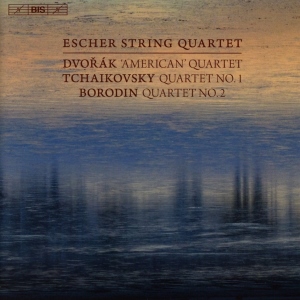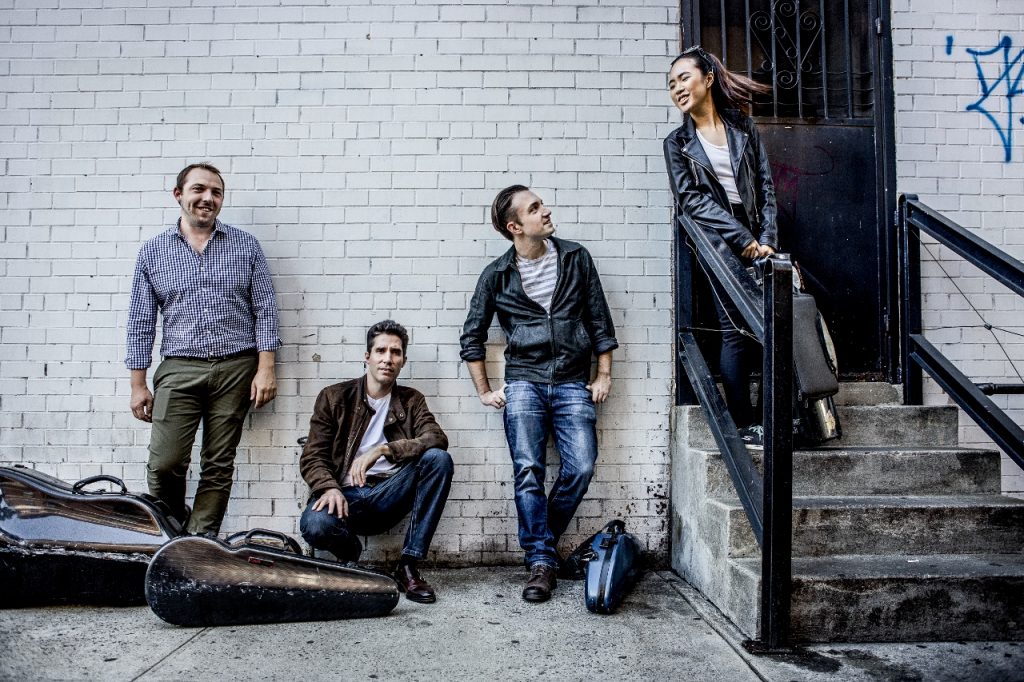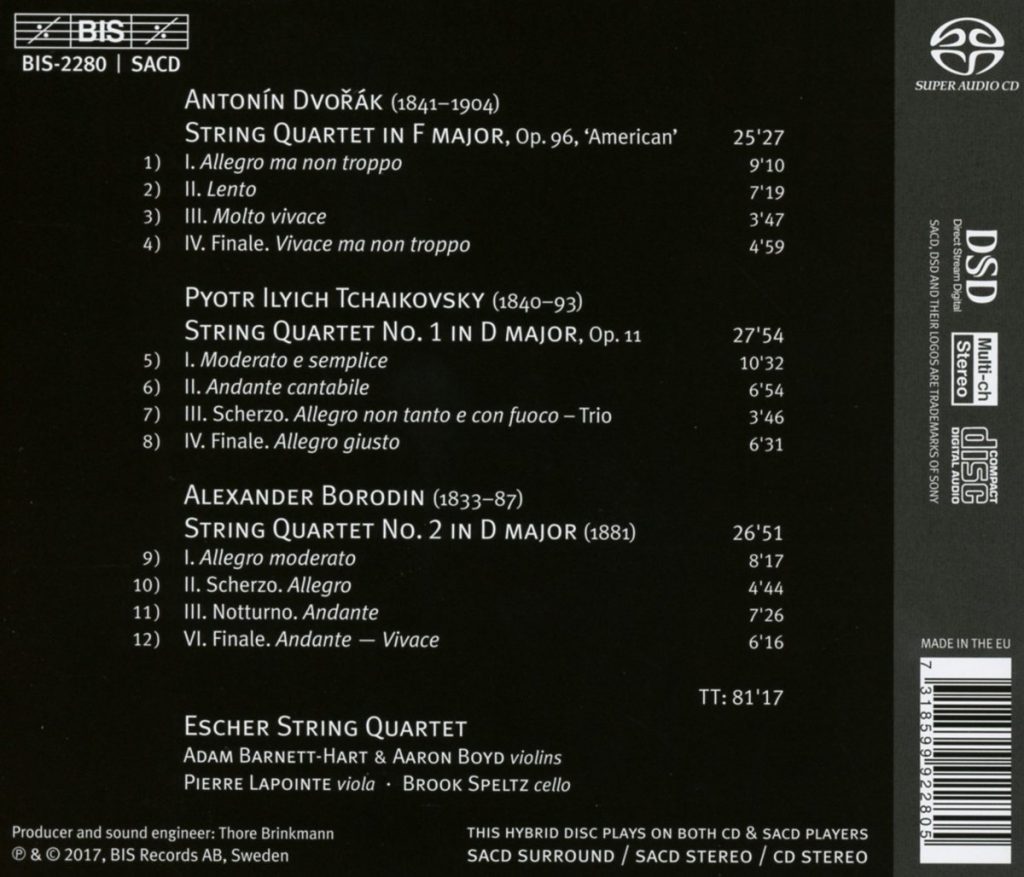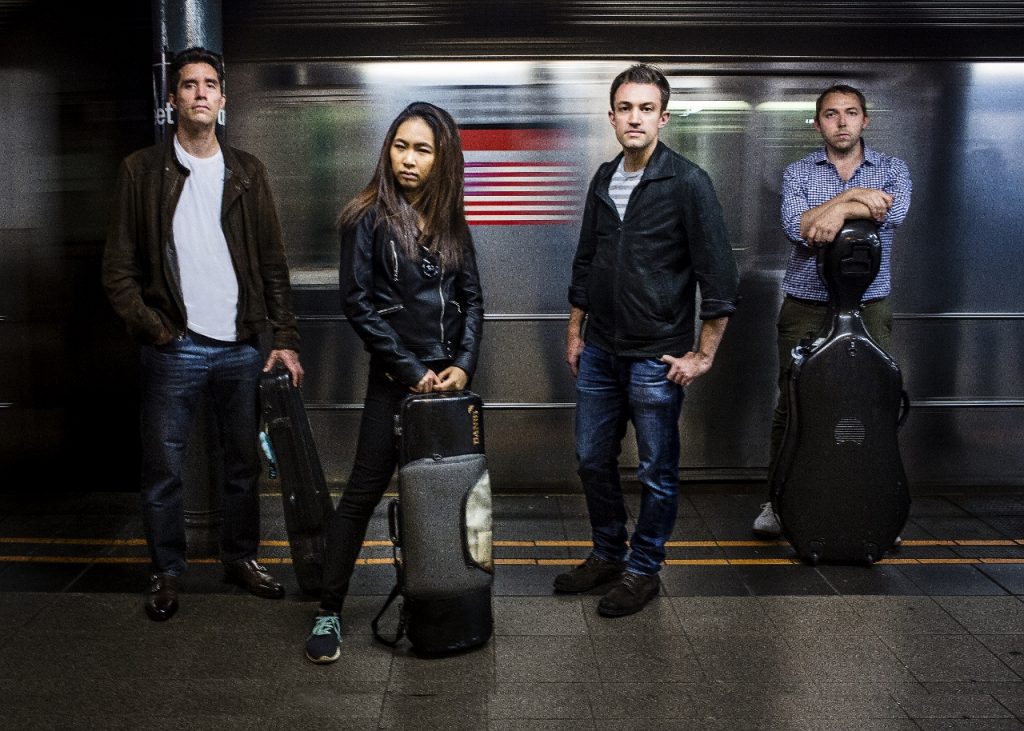AMERICAN QUARTET; AMERICAN ENSEMBLE:
OH, BEAUTIFUL!
Dvořák’s American Quartet is one of the most famous and loved string quartets, mostly because of the memorable pentatonic melodies (five note per octave scales, which are often found in American folk music) that invoke the wide open prairies of the undeveloped heartland of the country for which it’s named. It’s also a cheerful piece, every bit as uplifting and inspiring as his New World symphony and celebrated cello concerto. The impassioned lyricism, the harmonic creativity, the rhythmic vitality, the melodic invention, and the ensemble writing all combine to yield an amazing work.
But isn’t there already a plethora of recordings of this piping hot chestnut? So, it was surprising to see that the top-of-the-ranks Escher String Quartet not only recorded this piece for their newest CD from BIS Records, but used it as a springboard for two equally covered, equally famous, and equally well-loved quartets: Tchaikovsky’s No 1 in D major, with its iconic melody in the first movement, and Borodin’s No. 2 in D major, which gave Robert Wright and George Forrest some of the tunes for their 1953 Broadway musical, Kismet.
Well, one listen is all you’ll need to see why this young American quartet, around since 2005, took it on. As with their complete Mendelssohn Quartets on the BIS label, everything old is new again.
The lightness, the bounce, the sturdy pace, and the cheerful optimism of the Dvořák – which the players give an even tone sans melodramatic crescendi — somehow make the American sound even more American. Close your eyes and let that Copland-esque warmth and exciting spirit – and the superior SACD sound – wash over you. You may just espy a horse and buggy energetically trotting down the road between farms and cultivated fields on a warm, spring day.
Along with the quartet’s remaining original members, violinist Adam Barnett-Hart and violist Pierre Lapointe, are violist Aaron Boyd and cellist Brook Speltz. These three pieces don’t get a cerebral performance, like the Emerson (which recorded the same quartets in the same order back in 1995), but a very soulful rendering, straight from the Grand Age of Composers. As in all good quartets, there is no “standout” performance, just a seamless cohesion between the members.
For the Tchaikovsky, the warmth of their playing hits the ear first, but what is really impressive is how naturally they make the changes of pace and mood unfold in the opening movement, the Andante Cantabile — which is based on a folk song Tchaikovsky had heard in Ukraine, and is more often heard as a standalone piece. The Escher’s playing, at once folk-like in its simplicity and hymn-like in its reverence (matching their work on the Dvořák), makes it stand out as the convincing heart of the four-movement quartet.
Although Alexander Borodin was not first and foremost a musician or composer, he nonetheless produced an abundance of works in virtually all popular genres. Many of his works remain in the standard repertoire today. Of his numerous chamber works, the Second String Quartet is easily his most recognizable. Performed in the same lush, Romantic vein, the players neither shy away from nor over-exaggerate the work’s overt opulence and lyricism, thus avoiding the pitfall of making the quartet overindulgent or saccharine. The ensemble produces a tight-knit sound that pleasantly brings out the active inner voices. Intonation is solid throughout the 80+-minute disc, which sounds remarkably crisp. A highly recommended effort.
photos by Sarah Skinner
Escher String Quartet
Dvořák, Tchaikovsky & Borodin
BIS Records
1 disc (SACD Hybrid) | 12 tracks | 81:17
released January 5, 2018
available at BIS and Amazon




